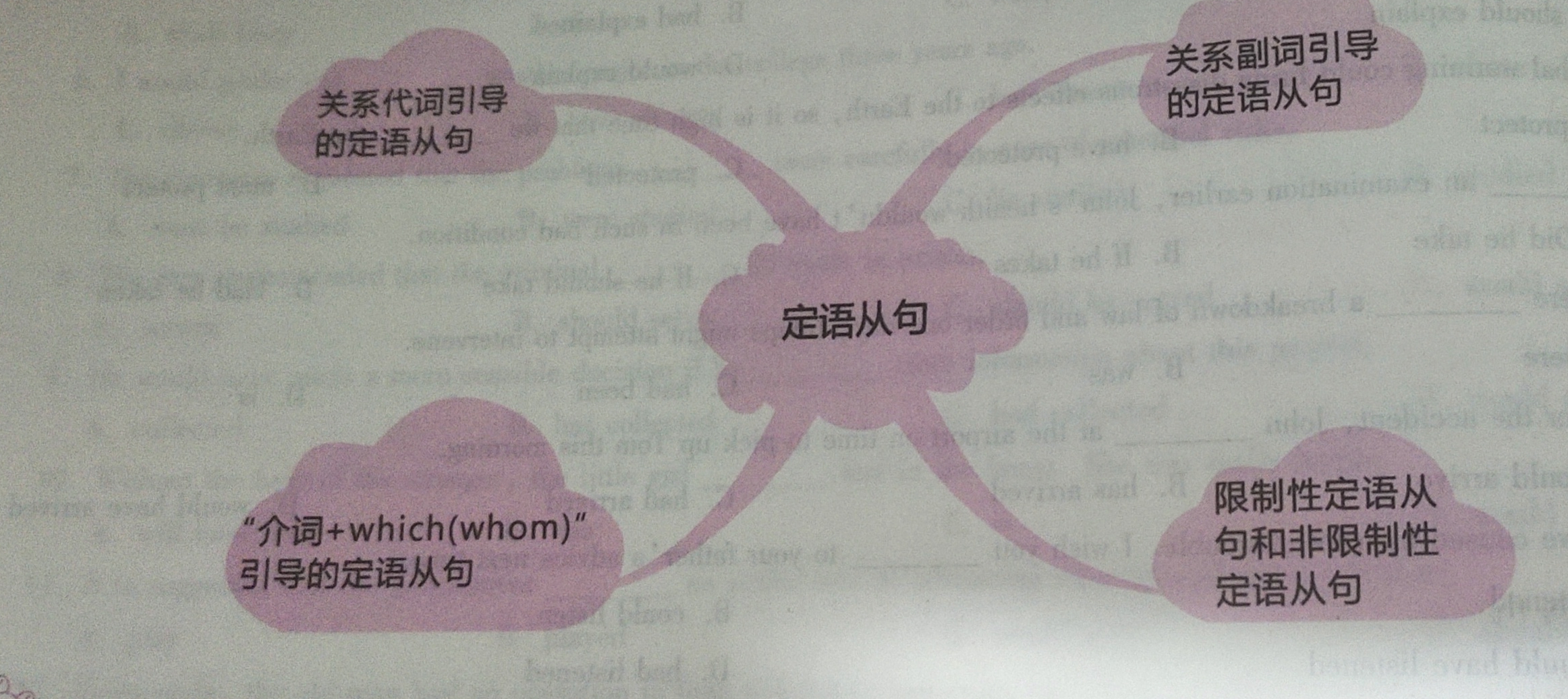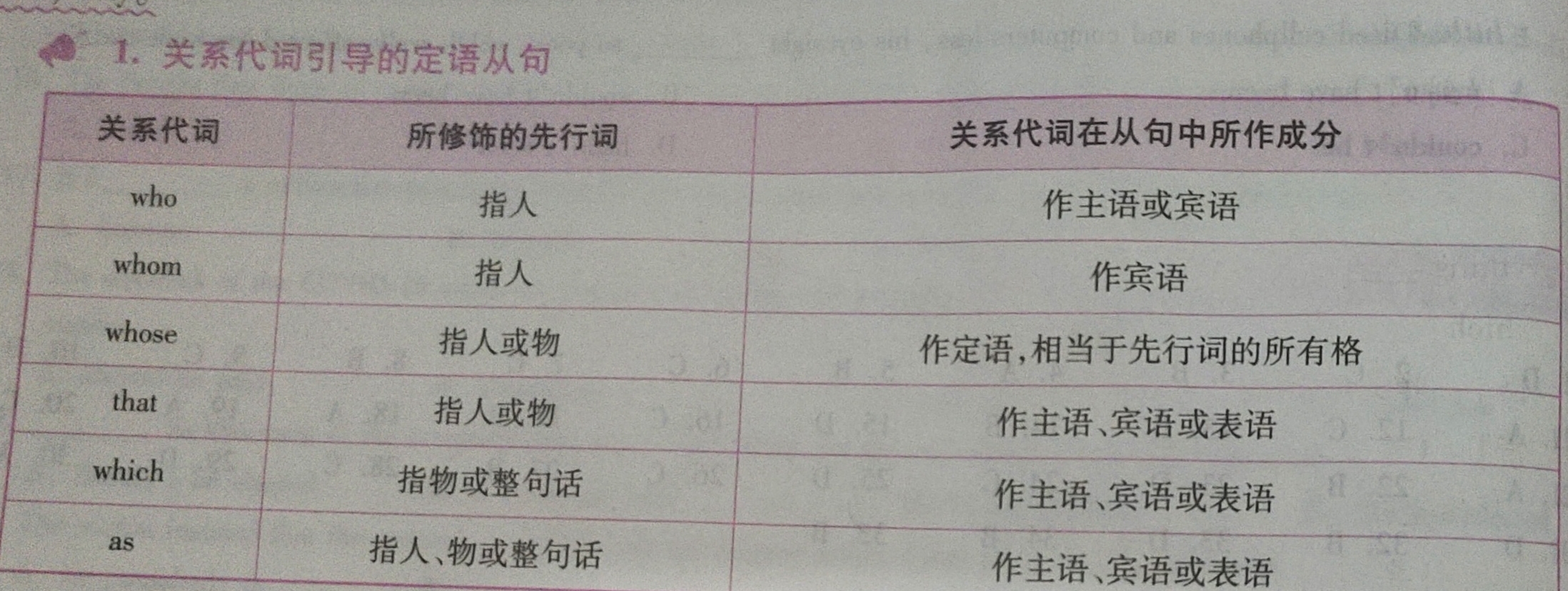29.定语从句



在复合句中充当定语成分的从句叫作定语从句,被定语从句修饰的对象称为先行词。按照英语语法规则,定语从句通常放在先行词后面,但也有特殊情况。根据关系词在定语从句中的不同用法,可将其分为关系代词和关系副词。关系代词有who, whom, whose, that,which, as;关系副词有when,where, why。

引导定语从句的关系代词(who, whom, whose, that,which, as)有三个作用:1连词的作用,把主句和从句连接起来;2代词的作用,指代所修饰的先行词:3一定的语法作用,在从句中可以作主语、宾语、表语等成分。
The lady who/that will give us a talk tomorrow is a professor.
明天将给我们作演讲的那个女士是一位教授。
The young man (who/whom/that) I met on campus yesterday is from the UK.
我昨天在校园里遇见的那个年轻男子来自英国。
The teacher wants to talk to the students whose homework hasn't been handed in.
这位老师想要跟那些还没交家庭作业的学生谈谈。
The magazine (that/which) you recommended to me is so interesting.
你给我推荐的那本杂志很有趣。As we said at the meeting,our goal is to meet the needs of the customers.
正如我们在会议上说的那样,我们的目标是满足客户的需要。
关系代词that有时可以和which互换,但两者的用法也有不同,其区别主要有以下几点:(1)当先行词是all,anything, everything, something, nothing, much, litle, none,few等不定代词或被这些不定代词修饰时,关系代词一般要用that。 that在从句中充当宾语时也可以省略。
The government promised to do all (that) it can to relieve the hardships of people.
政府承诺尽其最大努力减轻人民的困苦。
Is there anything (that) I can do for you in this critical period?
在这个关键时期,我能为你做点什么吗?
The litle information (that) I could get about the event was largely contradictory.
我能得到的有关该事件的少量信息很大程度上是相互矛盾的。
(2)当先行词被形容词最高级、序数词,或 the only,the very, the right, the last 等修饰时,关系代词只能用that that在从句中充当宾语时也可以省略。
This is the most interesting movie (that) I have ever seen.
这是我看过的最有趣的电影。
The first thing (that) we need to do is to find a hotel to have a rest.
我们首先需要做的事就是找一家宾馆休息一下。
The painting is the only thing that appeals to Jack.那幅油画是唯一吸引杰克的东西。
This is the very book (that) he has been looking for these days.
这就是他这些天一直在寻找的那本书。
This museum was the right place (that) my mother once visited.
这个博物馆正是我妈妈曾参观过的地方。
(3)当关系代词在从句中作介词的宾语,且介词在关系代词之前时,关系代词应用which,且which不可省略;介词在从句句末时,关系代词用which或that均可,且which/that常可省略。
He teaches in a school, in the middle of which stands a statue.
他在一所学校教书,学校中间立着一座雕像。
I have problems of my own (which/that) nobody can help me deal with.
我有我自己的问题,没有人能帮助我解决。
(4)当主句是以who或which开头的疑问句时,定语从句的引导词应用that,而不用who或which。that在从句中充当宾语时也可以省略。
Who is the man that is standing in front of the crowd?
站在人群前面的那个男人是谁?
Which is the office (that) the principal of the school works in?哪一个是这所学校的校长工作的办公室?
先行词如果是指人的one,ones,anyone或those时,关系代词宜用who或whom,不宜用that。如:
Those who have good manners will be highly respected.那些有礼貌的人会受到高度尊敬。
(5)当并列的两个先行词分别表示人和物时,定语从句应用that引导,而不能用which。that在从句中充当宾语时也可以省略。
The seriter and his novel (that) you have just talked about are really well known.
你刚才谈到的那位作家以及他的小说十分有名。
在“介词+which(whom)”结构中,关系代词用which还是用whom,取决于前面的先行词是物还是人。若先行词是物,用which;若先行词是人,用whom。如:
We will study these raw materials from which the human body derives energy.我们将研究人体从中获得能量的这些原料。
I want to find a person with whom I can discuss music.我想找一个能和我讨论音乐的人。
2.“介词+which(whom)”引导的定语从句
如果which或 whom在定语从句中充当介词的宾语,那么这个介词可以提到which/whom之前,构成“介词+which(whom)”结构,引导定语从句。但若介词和从句中的动词构成固定的动词短语(如look after, look for, look forward to等),一般不能将其拆开提前。
I do not know the girl with whom you just shook hands.
我不认识刚才和你握手的那个女孩儿。
The expert with whom all of us are familiar will visit our company.我们所有人都熟悉的那位专家将访问我们公司。
He'l never forget the policeman,by whom he was saved from the lake.他将永远不会忘记从湖中救出他的那个警察。
He lost the important document, because of which he was criticized.他遗失了那份重要的文件,为此他受到了批评。
“介词+which(whom)”的常见结构有两种形式。
(1)“the+名词tof which”和“of which the+名词”。
这种结构可以用“whose+名词”代替,whose指代的先行词既可指人,又可指物。“whose+名词”在从句中可作主语、动词或介词的宾语。
This is the book the cover of which/of which the cover/whose cover is designed by Mr. Jones.
这就是那本封面由琼斯先生设计的书。
(2)“表示部分的词语+of+关系代词(which, whom)”。
常见的表示部分的词语有:不定代词all,both, none, either, some, any, most, few, several等;数词(基数词、序数词、百分数、分数);数词+名词;the+最高级/比较级。
Present at the meeting were almost experts on psychology, most of twhom came from the US出席会议的几乎都是心理学方面的专家,其中大多数来自美国。
在“介词+which(whom)”结构中,which或whom前应该用什么介词,可以根据以下原则来决定:1根据介词与先行词的固定搭配来选择。如:
I will never forget the day on which Tom came to this company. (on the day 是固定搭配)我将永远不会忘记汤姆来这家公司的那一天。
②根据介词与从句谓语动词的固定搭配来选择。如:
That is the smartphone on which he spent 5000 yuan. (spend some money on sth.是固定搭配)那就是他花了5000元买的智能手机。
3根据介词与从句中形容词的固定搭配来选择。如:
The issue with which all of us are concerned will be discussed tomorrow. (be concerned with sth.是固定搭配)明天将讨论我们大家关注的问题。
4根据句意来选择。如:
This is Tom's notebook, without which he can not check his design. (句意中含有“没有”的意思)
这是汤姆的笔记本,没有它他就无法检查他的设计方案了。

(1)关系副词when,where,why 等引导的定语从句分别用来修饰表示时间、地点、原因等的先行词。这些关系副词在从句中均作状语。
We are living in an age when we can make comments freely.
我们正生活在一个可以自由发表评论的时代。
Yesterday I went to a famous mall where I met my classmate.
昨天我去了一个著名的商场,在那里我遇见了我的同班同学。
I don't know the reason why Jack didn't come yesterday.我不知道杰克昨天为什么没有来。
(2)在表示方式的先行词(the way等)之后,可用that引导定语从句,that可省略,相当于in which;在表示时间、地点、原因等的先行词(the time,the place, the reason等)之后,可用that代替关系副词when,where, why 等引导定语从句,that可省略,相当于“介词+which”。
The way (that/in which) we work has changed radically in the past decade.
在过去的十年里,我们的工作方式已经彻底改变了。
She was all in black the day (that/when/on which) we met.
我们见面的那一天她穿了一身黑。
This is the place (that/where/at which/in which) we will stay for a few days.
这就是我们将要待几天的地方。
当先行词是way时,其后定语从句的引导词的选择主要有以下两种情况:
1引导词在从句中作主语、宾语等成分时,可以用that,which,作宾语时也可省略引导词。如:
Many students didn't understand the way (that/which) the professor explained in class.
许多学生不理解教授在课堂上解释的那种方法。
2引等用在双为中件方式就语时,可说用hat,in which,也可省略引导词 如:
He dida't uedertand the way (that/in which) I worked out the problem.
他不理解我解决这个问题的方式。
4.限制性定语从句和非限制性定语从句
根据定语从句与先行词的关系,定语从句可分为限制性定语从句和非限制性定语从句。
(1)限制性定语从句。
限制性定语从句与先行词之间的关系密切,从句是整个句子不可缺少的部分。如果去掉从句,句意就不完整或不明确。从句和主句之间不用逗号隔开。
This is the student for whom I bought the book.这是我为其买书的那个学生。
Those who want to go sign your names here please.
那些想去的人请在这里签上你们的名字。
039戏神
当先行词被such,the same修饰时,定语从句的引导词常用as。如:
I've never seen such a talented young man as he is.我从未见过像他这样才华横溢的年轻人。This is the same bike as I bought last month.这和我上个月买的那辆自行车一样。
注意:当先行词被 the same 修饰时,有时也用that引导定语从句,但其和as引导的定语从句所表达的意思不网。the same..s.强调前后所指的人或事物是同一类,the same..that..强调前后所指的人或事物是同一个。如
This is the same book as I read last week.这和我上周读的那本书一样。
This is the same book that I read last week.这就是我上周读的那本书。
(2)非限制性定语从句。
非限制性定语从句与先行词之间的关系不是很紧密,从句只是对先行词的附加说明。如果去掉从句,句子的意思仍然完整。从句和主句之间常用逗号隔开。非限制性定语从句的引导词有:which, who, whom. where, when, as, whose。
The lady, whom you met in our office yesterday,is our leader.你昨天在我们办公室遇见的那位女士是我们的领导。
I went to London,where I spent my summer holiday.
我去了伦敦,在那里度过了我的暑假。
He puts off the picnic until May 6,when he will not be so busy.他把野餐推迟到了5月6日,那时他将没那么忙。
非限制性定语从句不能用that或why引导,且从句的引导词不能省略。如:The book, that he lent her,is lost.(×)The book, which he lent her,is lost.(√他借给她的那本书丢了。
① as和 which 都可以引导非限制性定语从句,并在从句中作主语,宾语等成分,指代整个主句。As was planned,we finished our project before the holiday.
正如计划的那样,我们在假期前完成了我们的项目。
Jane told me she had apologized to Lucy for her mistake,which was a lie.
简告诉我她已经为自己的错误向露西道歉了,这是一个谎言。
2 a5引导的非限制性定语从句可以放在主句之前或之后,甚至可以插入主句中间;which引导的非限制性定语从句只能放在先行词之后。另外,as有“正如,正像”的意思。
As is known to all, China is a developing country.
众所周知,中国是一个发展中国家。
Little children, as is often the case, rely more on their parents.
情况常常如此,小孩子更多地依赖自己的父母。
One of the boys kept laughing,which annoyed her intensely
其中一个男孩儿不停地笑,这让她非常生气。
3很多as引导的非限制性定语从句都可以当作固定搭配,如as is often the case(情况常常如此),often happens(正如经常发生的那样),as is known to all as we all know(众所周知),as might be expected as was espected(正如所预料的那样),as has been said before(如前所述),as is mentioned above(正如上面所提到的那样)。
As often happens, things don't work out exactly as planned.
正如经常发生的那样,事情并不会完全按照计划的那样进展顺利。
As might be expected, the result of the experiment was not satisfactory.
正如所预料的那样,实验结果并不令人满意。
As has been said before,reading is a good way of learning English.
如前所述,阅读是学习英语的一种好方法。
选择使用哪个引导词来引导定语从句,可以根据以下原则来决定:
1 根据定语从句的种类,即分清是限制性定语从句还是非限制性定语从句。
2 根据先行词的意义,即分清先行词是指什么。
3 根据引导词的句法功能,即分清引导词在定语从句中所充当的成分。若引导词在从句中作主语、宾语、定语或表语,用关系代词引导从句;若引导词在从句中作状语,用关系副词引导从句。


 浙公网安备 33010602011771号
浙公网安备 33010602011771号